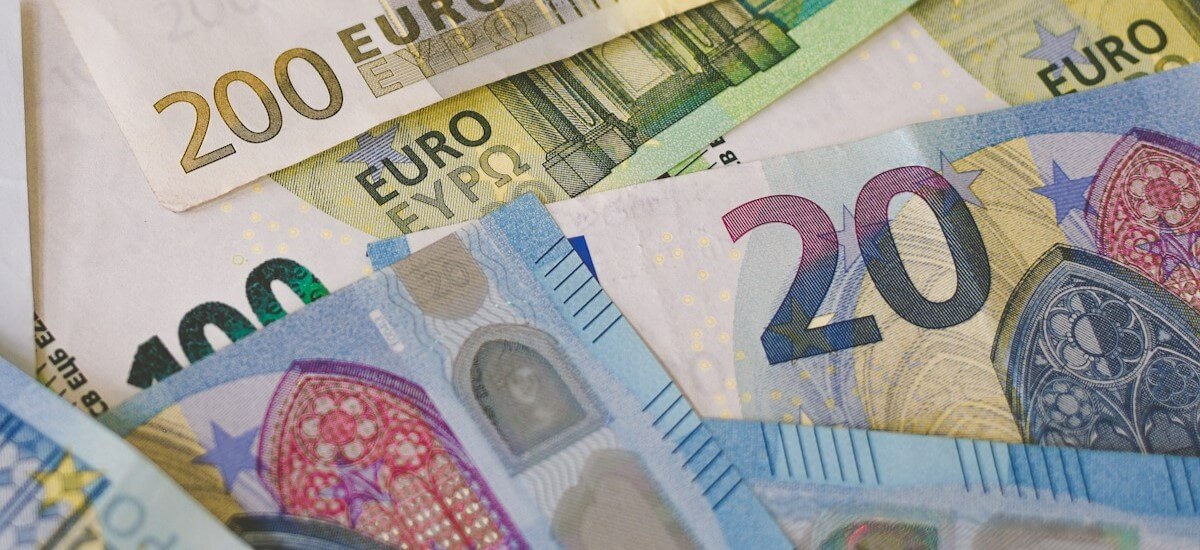ATMs in Germany: locations, fees, and tips
Read our essential guide to ATMs in Germany, including where to find them, exchange rates, withdrawal limits and how to avoid fees.

Travelling to Germany from the UK? Whether it’s a sightseeing weekend, holiday or a longer stay, you’ll find it useful to know a little about money, banks and currency in Germany.
And if you’re moving there, it’s absolutely crucial to get to grips with currency exchange, ATMs and day-to-day spending.
In this helpful guide, we’ll give you an overview of money in Germany. This includes tips for exchanging currency, where to find convenient ATMs and a list of popular banks.
So, let’s get started.
Germany’s currency is the euro, as it is part of the eurozone.
The Deutsche Mark (DM) was the primary currency of Germany until 2002, when it was replaced by the euro.
To find out how many euros you can get for your pounds, use our currency converter.

Here are a handful of useful-to-know facts about the euro in Germany:
If you’re visiting Germany from the UK, you’ll need to find the best way to exchange your pounds for euros - and get the best deal.
Staying in a big city? Read our handy guides to currency exchange in Hamburg, Berlin and Munich.
To get the most EUR for your GBP, and make your holiday budget go further, follow these top tips for exchanging currency in Germany:
Exchanging currency can sometimes be a confusing and complicated business. There’s always the worry you’ll get ripped off by hidden fees, even with providers who advertise low or no fees. It’s often the case that extra charges are hidden in an unfavourable exchange rate.
To avoid this, make sure you get to know the mid-market exchange rate for your chosen currency pair. Also known as the interbank exchange rate, this is the midpoint between the buy rate and the sell rate in global currency markets.
It is the ‘truest’ rate, not subject to markups by exchange desks. By using an online currency converter before switching out your home currency for euros, you’ll get an idea what your money is actually worth and be better prepared to spot tourist traps.
Explore live exchange rates for EUR.
When you travel abroad, often the fairest deal is through withdrawing cash from an ATM. As long as you choose to be charged in the local (euro) currency, then the ATM will normally give you the actual mid-market exchange rate - which is to your advantage.
Just watch out for ATM operator fees, or foreign currency transaction fees charged by your bank. This can happen when using a UK-issued debit card not designed for use in other countries.
At the airport, train station (bahnhof) or at your hotel, you’ll usually find a number of currency exchange desks. These are undoubtedly convenient in terms of location, but they’re almost always the most expensive way to exchange currency. This is because these services often mark up the exchange rate and charge hidden fees. So it’s best to avoid them unless you really have no choice.
Your home bank will probably exchange your currency into euro before you leave, seeing as it is one of the most commonly-used global currencies. Just check the rate - it will hopefully be similar to the ones you will find once you arrive in Germany. This means you’ll have your euros ready to spend when you arrive, and won’t need to resort to expensive currency exchange desks at the airport out of desperation.
Buying currency in advance also gives you the option to shop around at your leisure, comparing fees and exchange rates.
Germany used to be a cash-dominated culture, but this is gradually changing. Debit cards are widely used as a payment method, although credit cards are also accepted.
This means you should be able to pay with your debit card wherever Visa and Mastercard are accepted, including at shops, hotels, bars and restaurants.
The Wise card is a great option for spending while in Germany, as it can be used everywhere that cards are accepted and has no foreign transaction fees. Even better, it automatically converts the currency at the mid-market rate whenever you spend, for just a small conversion fee*.
So if you don’t fancy carrying cash around with you, but your bank charges fees to use your debit card abroad, the Wise card is the ideal solution.
Find out more about the Wise card 💳
And if you’re thinking about opening an account in Germany, the Wise account could be a convenient and money-saving option.
ATMs in Germany are plentiful, and the good news is that most are multilingual. Your Visa or Mastercard debit card should be accepted without any problems.
Some banks have partner agreements with other banks, such as Deutsche Bank and Barclays. This could save you withdrawal fees when you’re taking out money. So, it’s always worth checking for partner agreements with your local bank before you travel.
Also, big cities will often have branches of major banks that may help you withdraw money with lower fees. Try to use main bank branches if possible, as ATMs at railway stations or convenience stores may charge extra.
To help you find the most convenient ATMs close to where you’re staying in Germany, check out these online locators:
If you do need the services of a bank, such as to open an account or withdraw a large sum, here are some of the biggest and most popular German banks:
See a full list of banks in Germany.
If you’re looking to open up a bank account in Germany, a couple of the most expat-friendly banks to check out include:
A bank isn’t the only way to manage your money in a new country. You could find it easier and even cheaper to use an alternative such as Wise.
Open a Wise multi-currency account and you can hold, send, spend, receive and convert money in a whopping 40+ currencies at once - and all online.
You can also send money back to the UK and worldwide at the mid-market exchange rates with low fees*.
There’s even the Wise card, ideal for international spending in 150+ countries, including Germany. It automatically converts your money to the local currency at the mid-market exchange rate, whenever you spend.
Plus, you can keep track of it all on the move using the handy Wise app.
Learn more about Wise products below:
The use of cards in Germany is increasing, but around 60% of purchases are still paid for in cash.2 So, it could be worth having a few euro notes on you just in case.
Traveller’s cheques aren’t widely accepted in Germany. They’re generally perceived to be an inconvenience these days, so you may have difficulty finding a place to cash them. However, some larger hotel chains may still accept them. If unsure, it’s always best to check in advance.
The euro symbol is usually added after the number in Germany. For example, a cafe menu is likely to display the cost of your coffee as 3 €.
You can take up to 10,000 euros into Germany before you need to make a declaration to customs authorities.3
Sources used for this article:
Sources checked on 09-04-2024.
*Please see terms of use and product availability for your region or visit Wise fees and pricing for the most up to date pricing and fee information.
This publication is provided for general information purposes and does not constitute legal, tax or other professional advice from Wise Payments Limited or its subsidiaries and its affiliates, and it is not intended as a substitute for obtaining advice from a financial advisor or any other professional.
We make no representations, warranties or guarantees, whether expressed or implied, that the content in the publication is accurate, complete or up to date.

Read our essential guide to ATMs in Germany, including where to find them, exchange rates, withdrawal limits and how to avoid fees.

This guide will provide an overview of tax-free shopping in Germany so you can receive your VAT refund in cities like Munich and Berlin and save money.

What’s the best way to buy train tickets in Germany? A handy guide including step-by-step instructions and FAQs.

Check out our handy guide to using PayPal in Germany, including what fees you can expect.

Should you pay with cash or card in Germany? A handy guide including cash etiquette, German ATMs and using your UK card.

If you’re planning to visit the vibrant capital of Germany, you should definitely go around Pride time. Berlin has long been at the forefront of LGBTQIA+...